North Campus, Guangdong University of Foreign Studies, November 9th 2019: The International Think Tank Forum of the 21st Century Maritime Silk Road (2019) was held at Guangzhou Baiyun International Convention Center. Government leaders from the National Development and Reform Commission; the International Department of the CPC; the Ministry of Foreign Affairs of the People’s Republic of China; and relevant leaders from the People’s Government of Guangdong Province, Guangdong Provincial Committee of the Chinese People’s Political Consultative Conference attended the forum. They were there alongside 300 government officeholders, the Consul Generals of Guangzhou, representatives of various Think Tanks; experts and scholars, business elites, and representatives of friendly international organizations from more than 30 countries along the Maritime Silk Road.
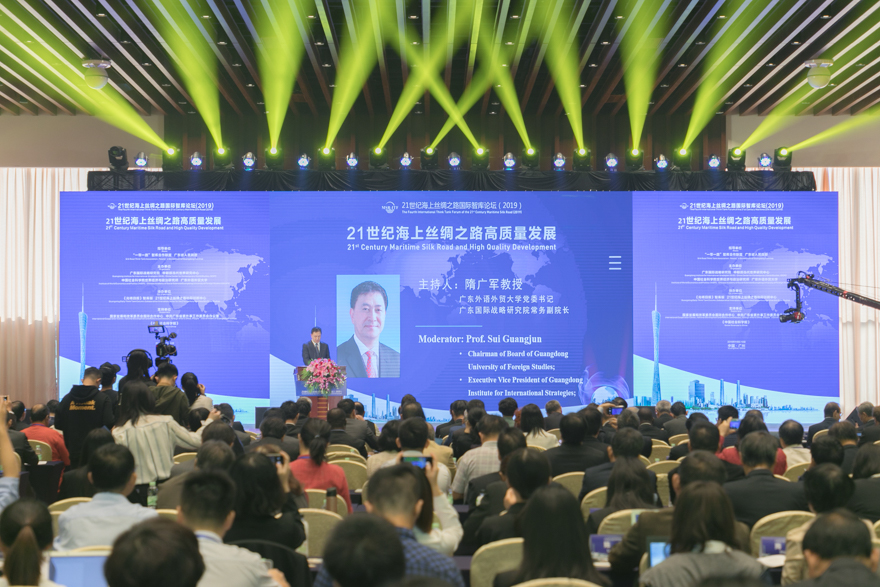
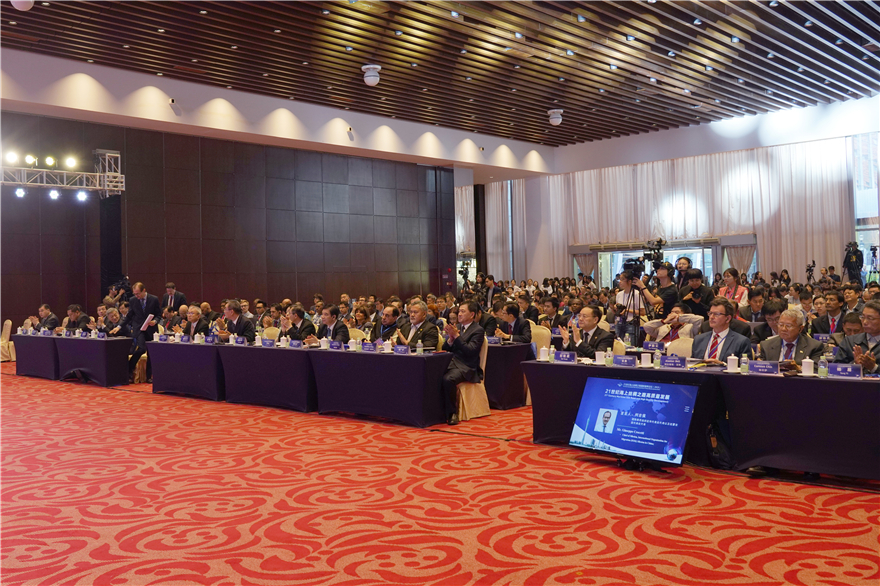
At the forum
The forum was organized by the Guangdong Institute for International Strategies (GIIS) and China Center for Contemporary World Studies (CCCWS), IDCPC; the Institute of World Economics and Politics (IWEP) of the Chinese Academy of Social Science; and GDUFS. It was hosted by the Silk Road Think Tank Association and the People’s Government of Guangdong Province. Guangming Daily Think Tank Column and Collaborative Innovation Center for 21st Century Maritime Silk Road Studies were co-organizers. The International Cooperation Center of National Development and Reform Commission, the Foreign Affairs Office, the People’s Government of Guangdong Province, and Social Science in China were supporters.
The theme of the forum was the 21st Century Maritime Silk Road and High-Quality Development, which was divided into four parts: the opening ceremony; the keynote speech; the plenary session; and the parallel panels. There were twelve parallel panels in total, respectively are about the “Belt and Road” Initiative and in-depth development cooperation; the “Belt and Road” Initiative and China South Pacific Islands Cooperation; the “Belt and Road” Initiative and International Education Cooperation; the “Belt and Road” Initiative and High Quality Development; the “Belt and Road” Initiative and Global Economic Governance; the “Belt and Road” Initiative and International Forum for Sinologists and Translators: Intercultural Dialogue and Consilience; the Construction of the Great Bay Area of Guangdong, Hong Kong and Macao and its Cooperation with “Belt and Road” Initiative; China’s Image, and Overseas Communication; the “Belt and Road” Initiative and People-to-people Exchanges; the “Belt and Road” Initiative China-ASEAN People-to-people Exchanges; and Belt and Road Construction and Corporate Overseas Social Responsibility and International Migration.
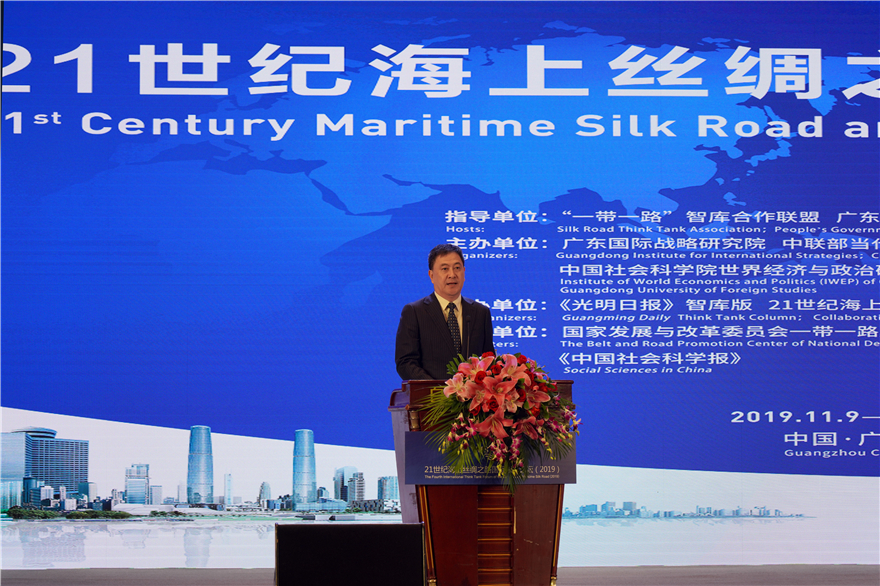
SUI Guangjun hosted the opening ceremony
The opening ceremony of the forum was hosted by SUI Guangjun, Chairman of the Board of GDUFS and Executive Vice President of GIIS. He mentioned that this forum will contribute to increase cooperation in the systems of development between the countries along the maritime silk road. Together all the countries can achieve the dream of “Extensive Consultation, Joint Contribution, Shared Benefits, Mutual Benefits and Double Gains”, stepping into an era of “The Belt and Road High-Quality Development”. SUI pointed out that GDUFS responded actively to the great needs of the development of Guangdong Province and China. GDUFS will utilize its advantages in education to offer powerful support in intelligence and talented people for the development of China and the reformation of Guangdong Province.
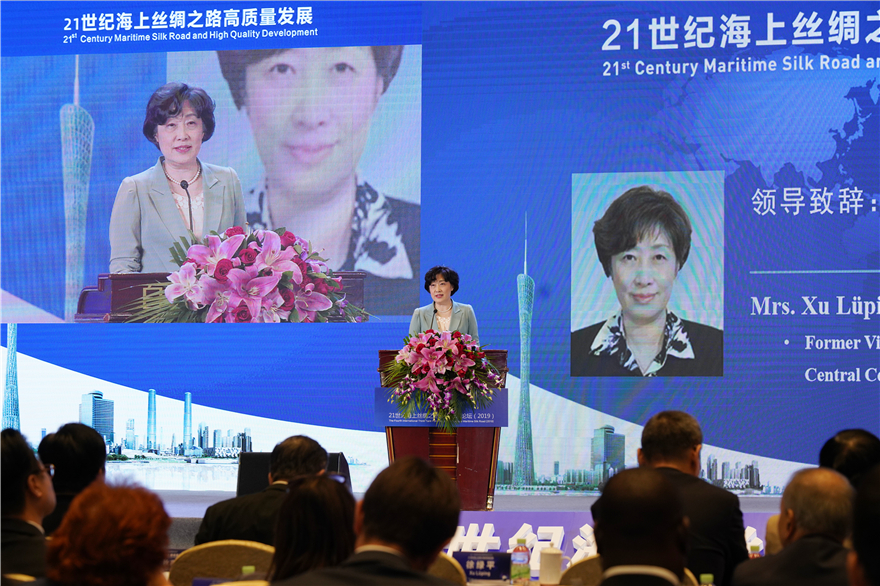
XU Lüping delivered a speech
XU Lüping, Former Vice Minister of the International Department of CPC, expressed her sincere hopes that all participants based on the consensus made at the Second Belt and Road Forum for International Cooperation to speed up the process of high-quality development for the 21st Century Maritime Silk Road. She mentioned that all should adhere to the Principle of Joint Development and Sharing, and stick to the concept of openness, greenness and connection. All countries should strive to achieve sustainable goals, to build higher quality cooperation and to contribute their best ideas.
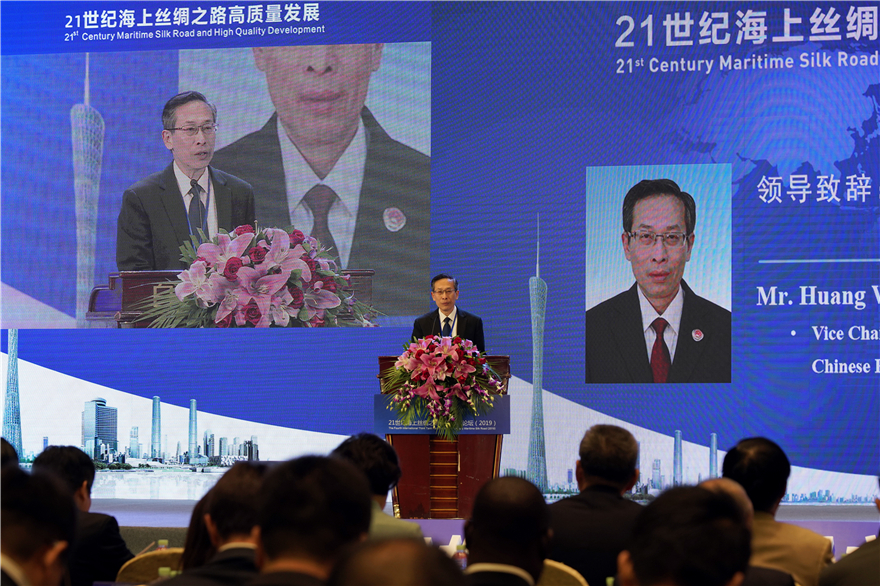
HUANG Wu gave a speech
HUANG Wu, Vice Chairman of Guangdong Province Committee of the Chinese People’s Political Consultative Conference, mentioned in his speech that he hopes all the attenders can develop in-depth discussion about the theme of “21st Century Maritime Silk Road and High-Quality Development”. He hopes all experts can contribute their wisdom and offer practical ideas to the promotion of co-development and the implementation of communication in various fields.
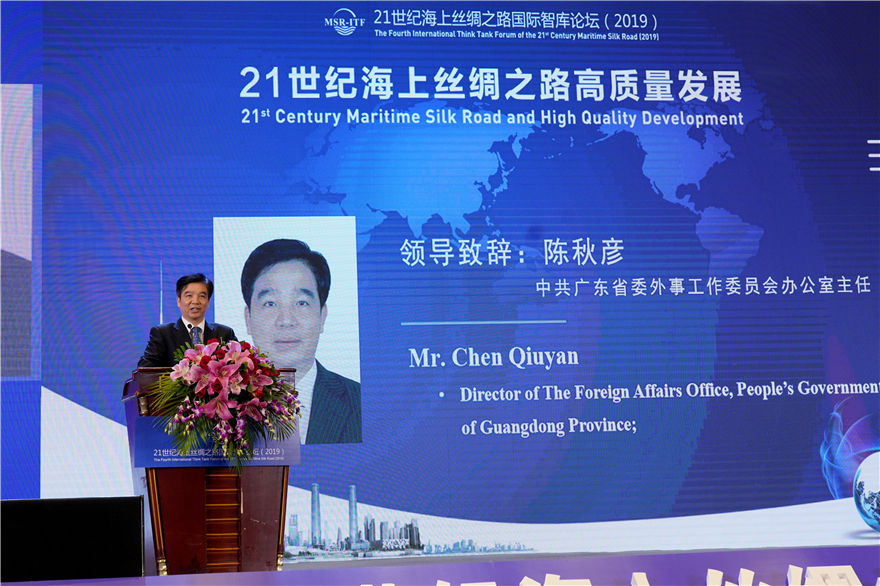
CHEN Qiuyan gave a speech
Chen Qiuyan, Director-General of the Foreign Affairs Office of People’s Government of Guangdong Province, said that the forum is a bridge to connect governments, universities, enterprises and Think Tanks. He sincerely hoped that all the participants can share their thoughts freely and discuss about future plans for the “21st Century Maritime Silk Road and High-Quality Development”.
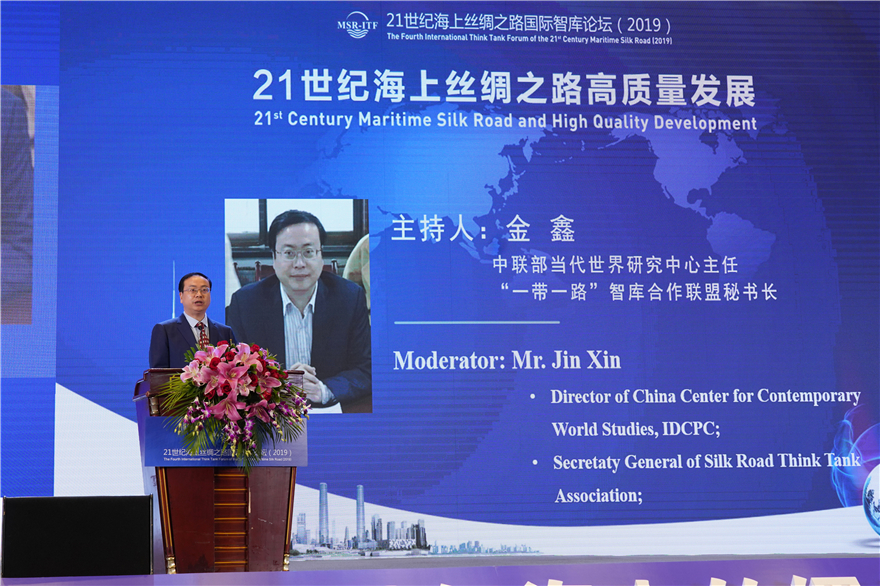
JIN Xin hosted the keynote speech part
The keynote speech session of the forum was hosted by JIN Xin, Director of China Center for Contemporary World Studies, IDCPC and Secretary General of Silk Road Think Tank Association. Distinguished guests addressed in the forum, including LIN Yifu, Former Vice-President of World Bank, Dean of Institute of New Structural Economics and Former Vice Chairman of the All-China Federation of Industry and Commerce; Subramanian Swamy, Member of Parliament and Former Union Cabinet Minister from India; ZHAI Dongsheng, Director of Belt and Road Promotion Center, National Development and Reform Commission; Pornchai Danvivathana, Secretary General of the Asian Cooperation Dialogue; Giuseppe Crocetti, Chief of Mission PRC, International Organization for Migration, IOM.
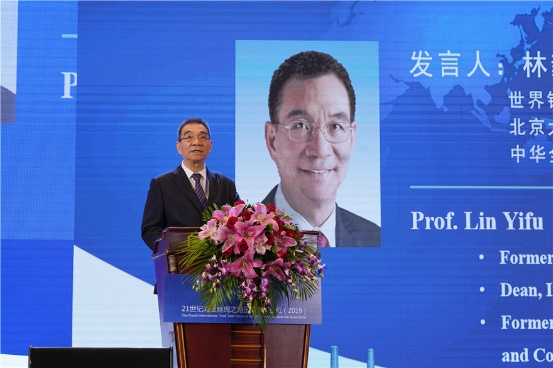
Lin Yifu addressed at the forum
Lin Yifu: it is highly possible that China will rank among the world’s high-income countries by 2025.
Lin Yifu pointed out that a wealthy people and strong nation are the common wish for developing countries in the world, which, however, only a few countries have achieved. After WWII, merely two countries and regions have developed from low-income to high-income economies, which are Taiwan Province in China and Korea. Being the second biggest economy and the biggest trading country, it is highly possible that China will rank among the high-income countries by 2025. The successful development model for China lies in improving the efficiency of resource allocation and promoting the continuous improvement of labor productivity by eliminating infrastructural bottleneck. The Belt and Road Initiative proposed by President Xi develops the community of a shared future through infrastructure connectivity, and this proposal will prove a great contribution to other developing economies globally.
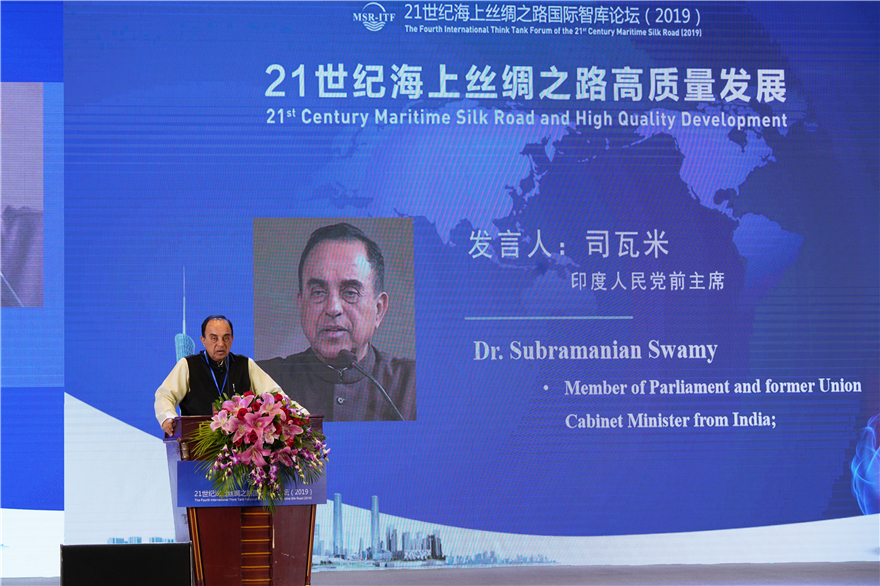
Subramanian Swamy addressed a speech
Subramanian Swamy: China and India will strengthen regional cooperation around the Belt and Road Initiative to bring win-win results.
Subramanian Swamy mentioned that as two important developing economies, whose population accounts for approximately 40 percent of the total world population, China and India will strengthen regional cooperation, especially in the fields of humanities, infrastructure and technology. He stated that the Belt and Road Initiative, especially the development of 21th Century Maritime Silk Road will exerts positive influence on India and other adjoining countries from the perspectives of communications, trade and infrastructure.
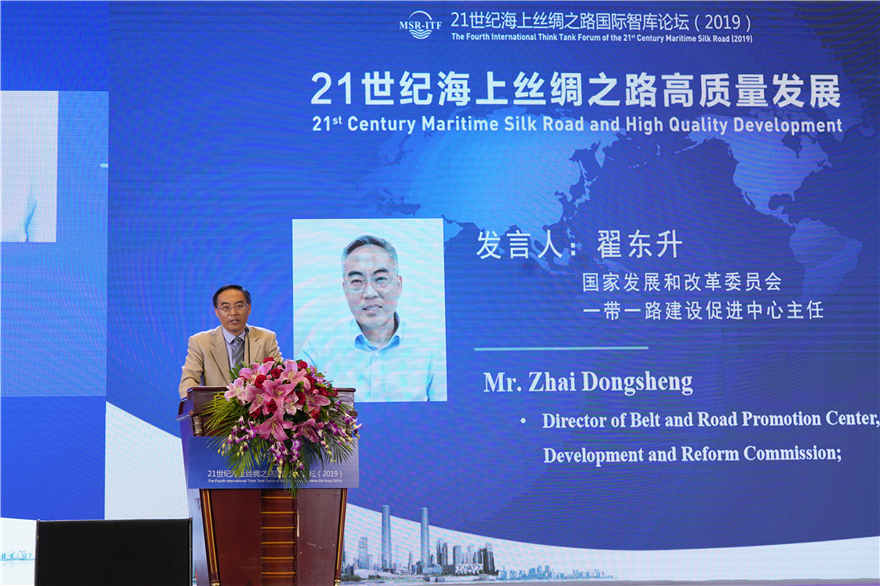
Zhai Dongsheng delivered a speech
Zhai Dongsheng: the countries and regions in the Belt and Road Initiative gain more benefits from cooperative planning.
ZHAI Dongsheng demonstrated specific thoughts about further expanding the scope of China’s opening-up, promoting international cooperation and constructing the community of a shared future from the prism of designing at the top level. He pointed out that the Belt and Road Initiative complies with market discipline, international rules and the principle of sharing and joint work. By all-round connections and communications, Zhai welcomed every country to participate, have complementary advantages, and share both accomplishments and risks so that the concerned countries and regions in this initiative may gain more benefits.
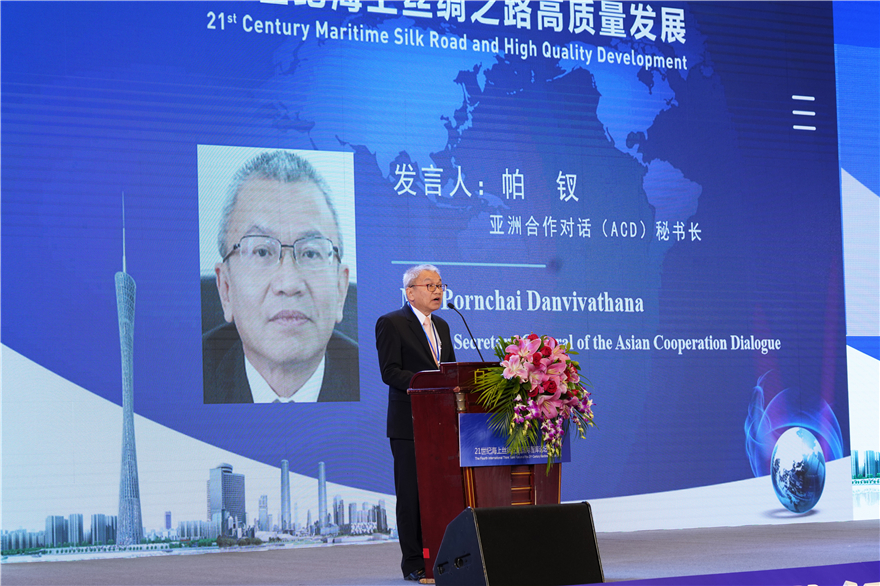
Pornchai Danvivathana delivered a speech
Pornchai Danvivathana: the economic miracles and developing wisdom of China have provided an outstanding example for various developing countries.
Pornchai Danvivathana stated that this year is the 70th anniversary of the founding of the People’s Republic of China, and the economic miracles and developing wisdom of China have provided an outstanding example for various developing countries. The objective of the Maritime Silk Road is to promote connections and communications between China and countries from the Association of Southeast Asian Nations(ASAN), and further construct the community of shared future. Thus, this proposal has played an important role in the development of this region. From the perspective of business cooperation and other perspectives, 35 member states in Asian Cooperation Dialogue will develop infrastructure, exchange information, technology and creative ideas, which are instrumental for ASAN in turning to a high-quality development model characterized by more balanced and innovation-driven economics.
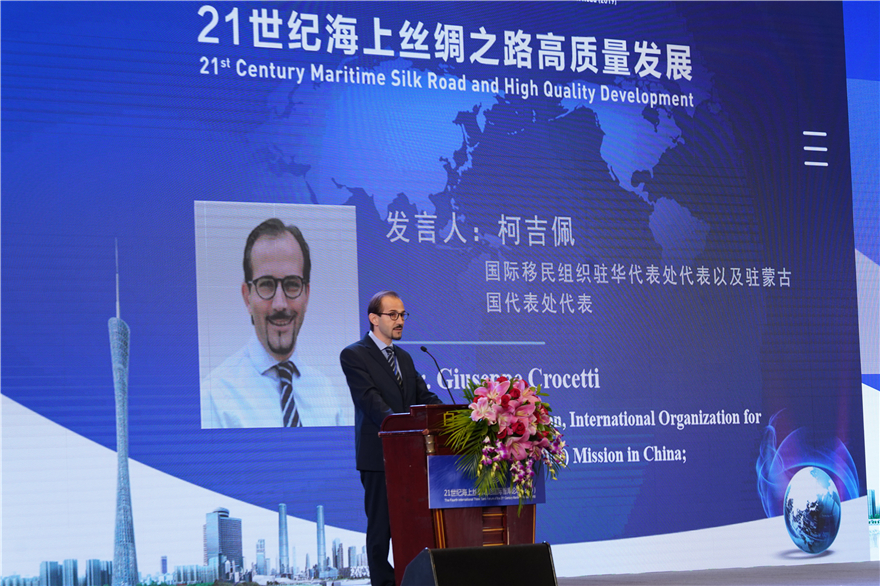
Giuseppe Crocetti addressed a speech
Giuseppe Crocetti: the Belt and Road Initiative will provide new economic drive to connected countries.
Giuseppe Crocetti pointed out that the theme of 21st Century Maritime Silk Road and High Quality Development is the combination of the Belt and Road Initiative and development. By giving priority to five cooperative fields related to connections and communications — will of the people, policy, facility, trade and funds, the Belt and Road Initiative will provide new economic drive to connected countries and facilitate a greater flow of labor force and professionals, which may give concerned countries important opportunities. Safe, ordered and conventional Immigration Security Contract will play an important role in reinforcing international cooperation and communication in the humanities and promoting high-quality development and joint prosperity.
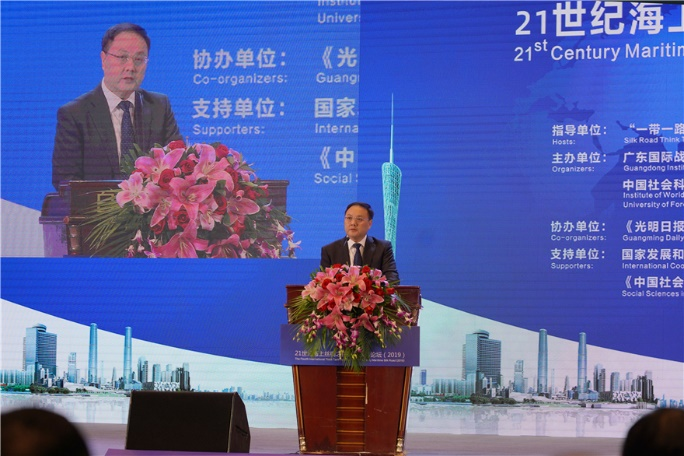
SHI Youqi hosted the plenary meeting
The plenary session of the forum was hosted by SHI Youqi, President of GDUFS. Guests addressed in the plenary meeting including ZHANG Yuyan, Academician of the Chinese Academy of Social Sciences, Director of the Institute of World Economics and Politics, Chairman of the Academic Committee of the Collaborative Innovation Center for the 21st Century Maritime Silk Road Studies; Patty Peter, Mayor of Luganville Municipal Council, Vanuatu; CHENG Jiacai, Director of Study Abroad Center of the Ministry of Education; Angela Murphy, Former Deputy Vice Chancellor at University of Central Lancashire, UK; HU Qianwen, Former Ambassador of the People’s Republic of China Extraordinary and Plenipotentiary to the Socialist Republic of Vietnam, the Kingdom of Cambodia and People’s Republic of Bangladesh; Alastair Bell, Board Member of New Zealand National Party; and Giray Fidan, Professor and Sinologist, AHBV University, Turkey.
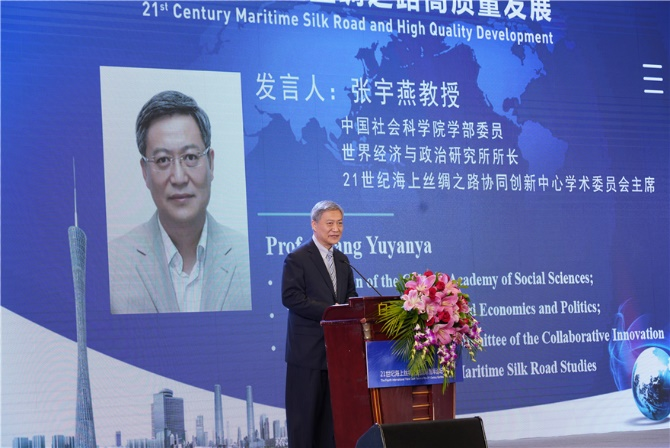
ZHANG Yuyan addressed a speech
ZHANG Yuyan: there is a close relationship between the high-quality development of the Belt and Road and the currently happening profound changes.
ZHANG Yuyan mentioned tha there is a close relationship between the high-quality development of the Belt and Road and the undergoing profound changes. On the one hand, in order to adjust to a situation in which network communication technology is growing sharply, countries along the routes should pay attention to the integration of appropriate technology and high technology actively to meet the market needs. On the other hand, it is necessary for these countries to build up a new and solid monetary system to face the challenges.
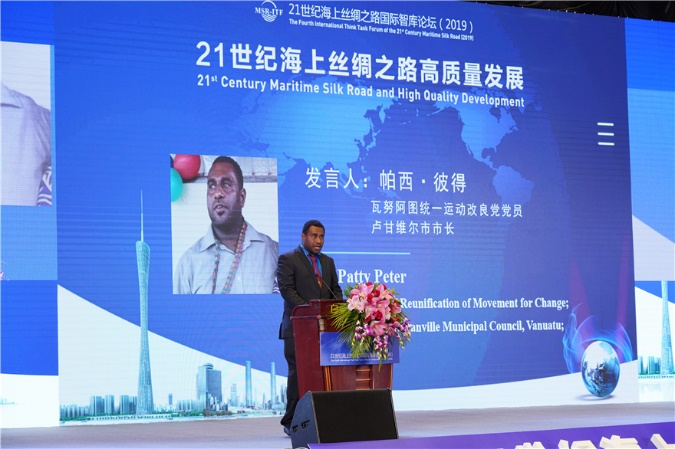
Patty Peter addressed a speech
Patty Peter: the cooperation agreement symbolizes a new beginning for both China and Vanuatu to extend the Maritime Silk Road.
Patty Peter pointed out the government of Vanuatu, an island country of the South Pacific, appreciated the efforts that the Chinese government has made in economic cooperation in the 21st Century Maritime Silk Road, which had improved the infrastructure in his country, from airport to transport. To promote the high-quality development of the 21st Century Maritime Silk Road, the city of Luganville signed a cooperation agreement with two other cities, Sanya and Zhuhai, which symbolized a new beginning for both China and Vanuatu to extend the Maritime Silk Road collaboration.
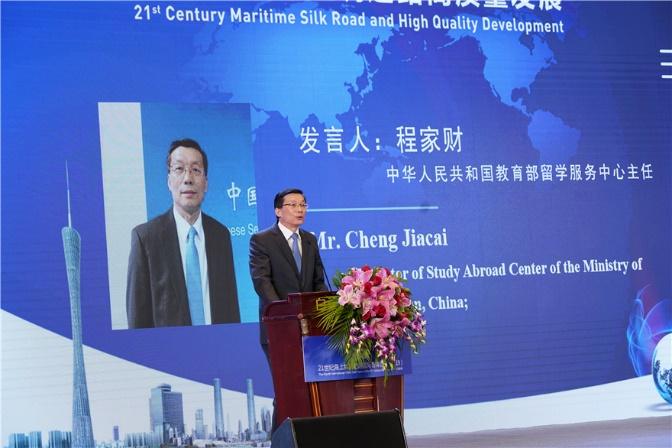
CHENG Jiacai addressed a speech
CHENG Jiacai: exchanging educational ideas has become one of the most significant international communication projects among countries related to the Belt and Road.
CHENG Jiacai demonstrated that, in 2019, the Study Abroad Center of the Ministry of Education has marked its 30th anniversary of establishment, during which time the center has made a great contribution to the development of Chinese overseas study. At the end of 2019, China had sent over 5.85 million people to study oversea and China is the largest source of international students in the world. At the same time, in 2018, China attracted 492 thousand foreign international students to study in China in various fields, among which students came from countries along the Belt and Road comprised over 60% of the total number. By enhancing cooperation with the international organizations, educational interchange will become an essential part of people-to-people and cultural exchange communication. Also, the program of studying in China helps China to increase its influence in higher education around the world, making education a vital bound to deepen the understandings between nations and countries.
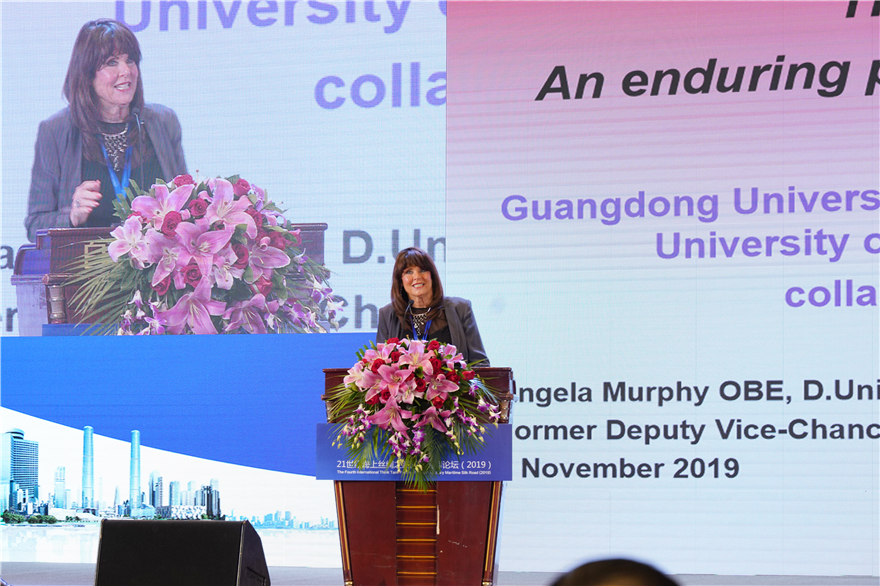
Angela Murphy addressed at the forum
Angela Murphy: the Belt and Road Initiative will have a powerful impact on higher education.
Angela Murphy reviewed the cooperation development between the University of Central Lancashire and Guangdong University of Foreign Studies and pointed out that the key factor of long-term win-win cooperation is innovation and common values. As the global uncertainty increases, universities that focus on liquidity and flexibility will become more competitive. “The Belt and Road” will deeply influence the structure of higher education. Universities in the Guangdong-Hong Kong-Macao Greater Bay Area will contribute a lot to boost further development.
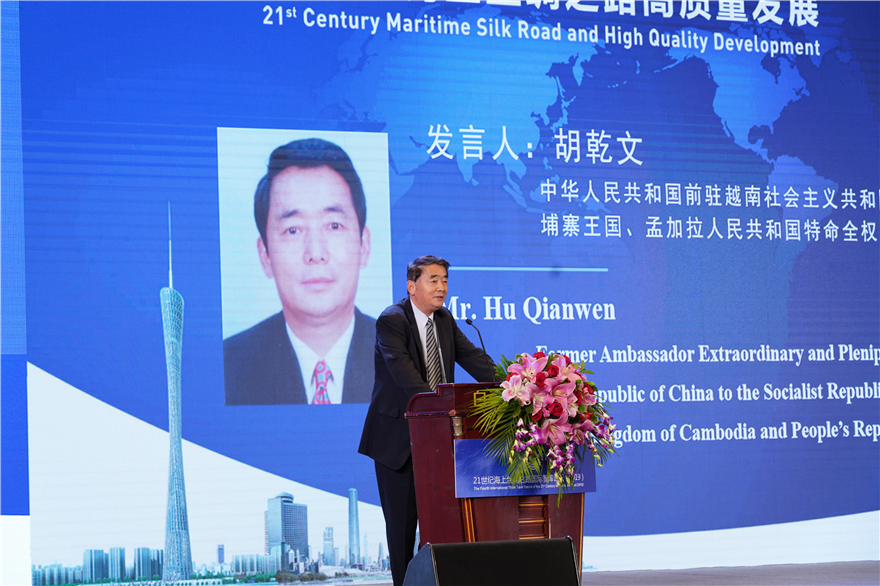
Hu Qianwen delivered a speech
HU Qianwen: Guangdong plays a decisive role in Belt and Road construction.
HU Qianwen stated that since President Xi Jinping paid an official visit to the Association of Southeast Asian Nations (ASEAN) and proposed the Maritime Silk Road in 2013, China has been establishing close economic trade relationship with ASEAN. Guanghzou, the national open port for thousands of years and the starting point of the Maritime Silk Road, will carry a big weight in the construction of the Belt and Road Initiative.
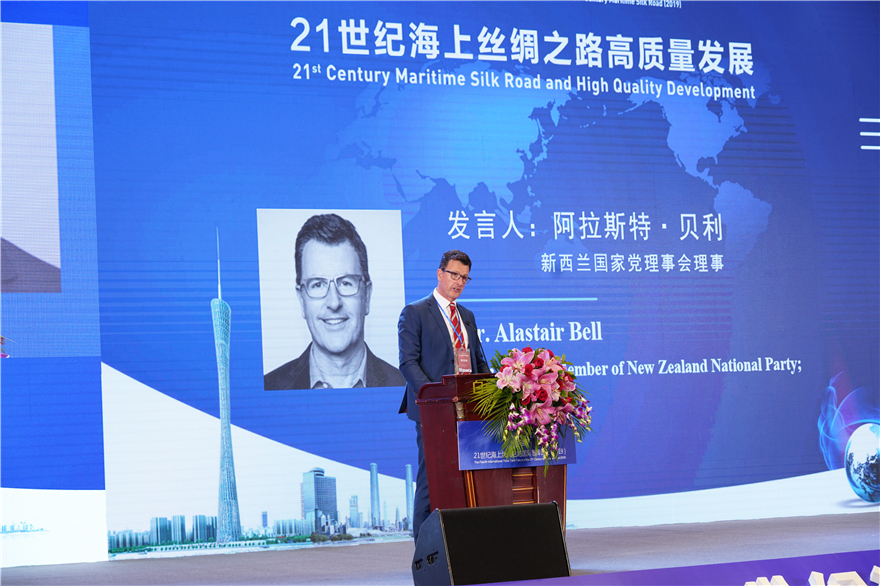
Alastair Bell had an inspiring speech
Alastair Bell: the Belt and Road Initiative signifies more opportunities.
Alastair Bell believed ‘Belt and Road’ indicates more opportunities, and only by learning from each other, countries along the Belt and Road, especially China and New Zealand, would create a brighter and more integrative future. Apart from the multicultural and peaceful business environment of New Zealand, the advantages in the aspect of innovative technology and sustainability would produce giant commercial opportunities.
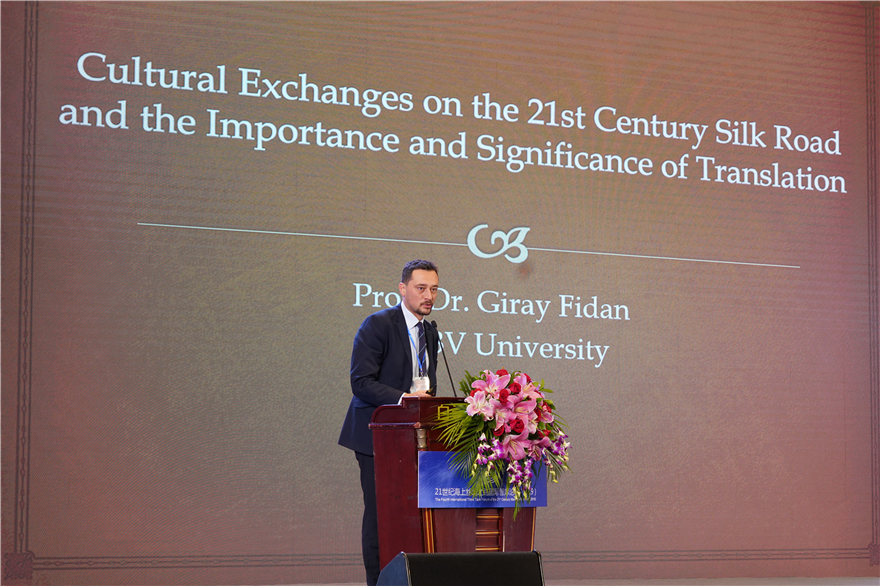
Giray Fidan addressed at the forum
Giray Fidan: Seeing is believing.
As a veteran sinologist, Giray gave his speech in Chinese for the whole process and shared his recent experience in translating Chinese literary classics into Turkish. He said his favorite Chinese phrase was ‘Seeing is believing’. He hoped that Turkish readers will have deeper understandings of China through his translations of Chinese classics, such as Master Sun’s Art of War, the Analects of Confucius, as well as some modern Chinese literature.
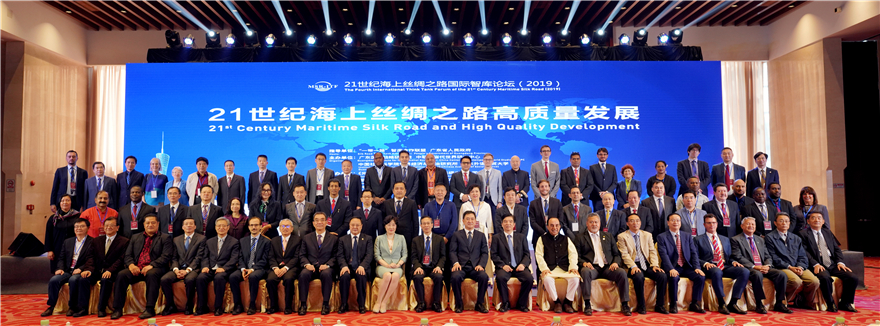
Group photo
After the meeting, twelve parallel panels were held. Distinguished guests conducted in-depth discussions respectively about the “Belt and Road” initiative and in-depth development cooperation; the “Belt and Road” initiative and global economic governance; the construction of the Greater Bay Area of Guangdong, Hong Kong and Macao and its Cooperation with “Belt and Road” initiative; a forum on the Belt and Road Initiative: China’s image, and overseas communication; Belt and Road Construction and corporate overseas social responsibility. Also, the panels focused on international migration, people-to-people exchanges, international education cooperation, and China-South pacific islands cooperation, etc.
The Collaborative Innovation Center for the 21st Century Maritime Silk Road Studies also held the 21st Century Maritime Silk Road Special Work Conference with the aim of cultivating the talents for other cooperative departments and finding the development direction for next step. Other participants included experts and scholars from Institute of World Economics and Politics (IWEP), China Center for Contemporary World Studies (CCCWS), Chinese Institute of International Studies, Xiamen University (XMU), Sun Yat-Sen University, Jinan University (JNU) and Yunnan University (YNU).

